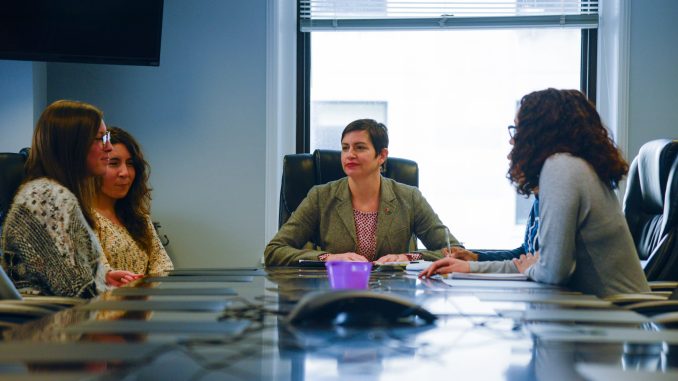
As a mother to a 3-year-old boy and 7-year-old girl, Abigail Ellis often thinks about the potential in every child.
Ellis, a 2006 master’s of social work alumna, is the executive director of the Mentoring Partnership & Resource Center, an organization that provides training, professional support and leadership to mentoring programs around Eastern Pennsylvania to help reach the maximum number of young people. Ellis works to provide children ages 7 to 17 with a mentor outside their own families.
“So many people see the need in their community so they start a mentoring program, but there’s a lot of research and evidence to what makes a good mentoring program,” Ellis added. “We know mentoring done well can be transformational for kids.”
Ellis began mentoring in college through internships at Episcopal Community Services and Philadelphia Safe and Sound, two programs that help children in Philadelphia.
Ellis said because she grew up in the suburbs, she did not have an understanding of urban issues until she began to study sociology as an undergraduate at Penn State in 1995. It was then that she learned about barriers that many kids face and started to believe in mentoring as a supplement to education, she added.
“A true education is going to go beyond the schools and the subjects that all our kids have to be tested on at the end of every year,” Ellis said. “They need to understand the world in many ways in order to thrive.”
Ellis believes a good mentor is someone who uses the “developmental approach” to help empower a mentee and recognize the potential, opportunity and strengths of children and their communities.
A poor mentor uses the “prescriptive approach” — seeing only the barriers a child faces and trying to fix them.
Ellis teaches mentors to recognize both approaches and to use the developmental approach when tackling problems.
“I think Abby is phenomenal leader,” said Ashley Bell, the partnership liaison at MPRC. “One thing that I admire about her leadership is her willingness to let each of us have a voice in matters concerning the program.”
Ellis said Emeka Nwadiora and Marsha Zibalese-Crawford, both professors in the College of Public Health, played a great role in her work at Temple.
“[Ellis] demonstrated an ability to organize people, utilize practice and administrative skills and communicate processes,” Zibalese-Crawford said. “She displayed an unusual awareness of topics on social and political concerns.”
Ellis worked for Big Brothers Big Sisters for 12 years and started the organization’s first school-based mentoring program before going to graduate school.
Now she helps mentoring programs like Big Brothers Big Sisters learn best practices and receive professional support through the MPRC.
“We really want to help develop mentoring programs and mentors to use the research and evidence-based practices that are out there to help empower youth, advocacy, connect people in the field and form peer support,” Ellis said.
“Mentoring is different than tutoring,” she added. “Mentoring programs are trying to develop all of those skills that go along with being successful in school … advocating for yourself and your education, life skills and character development.”
Madison Hall can be reached at madison.hall@temple.edu.


Be the first to comment